【重点突破】—— Echarts图表的介绍和使用
前言:百度Echarts是一个基于Canvas的纯Javascript图表库,提供直观、生动、可交互、可个性化定制的数据可视化图表。官网地址:http://echarts.baidu.com/index.html
一、Echarts基础
- 实例Demo:http://echarts.baidu.com/examples/

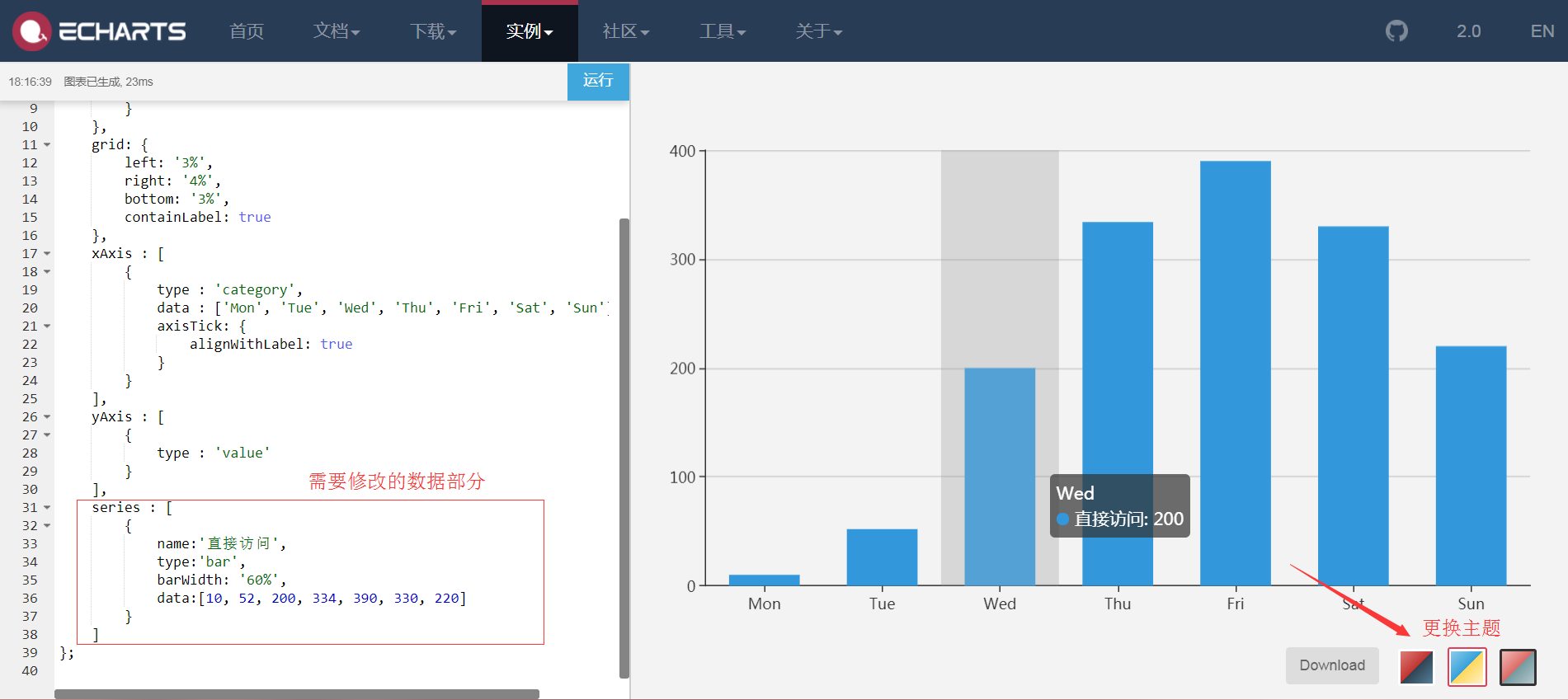
文档教程:http://www.echartsjs.com/option.html#title
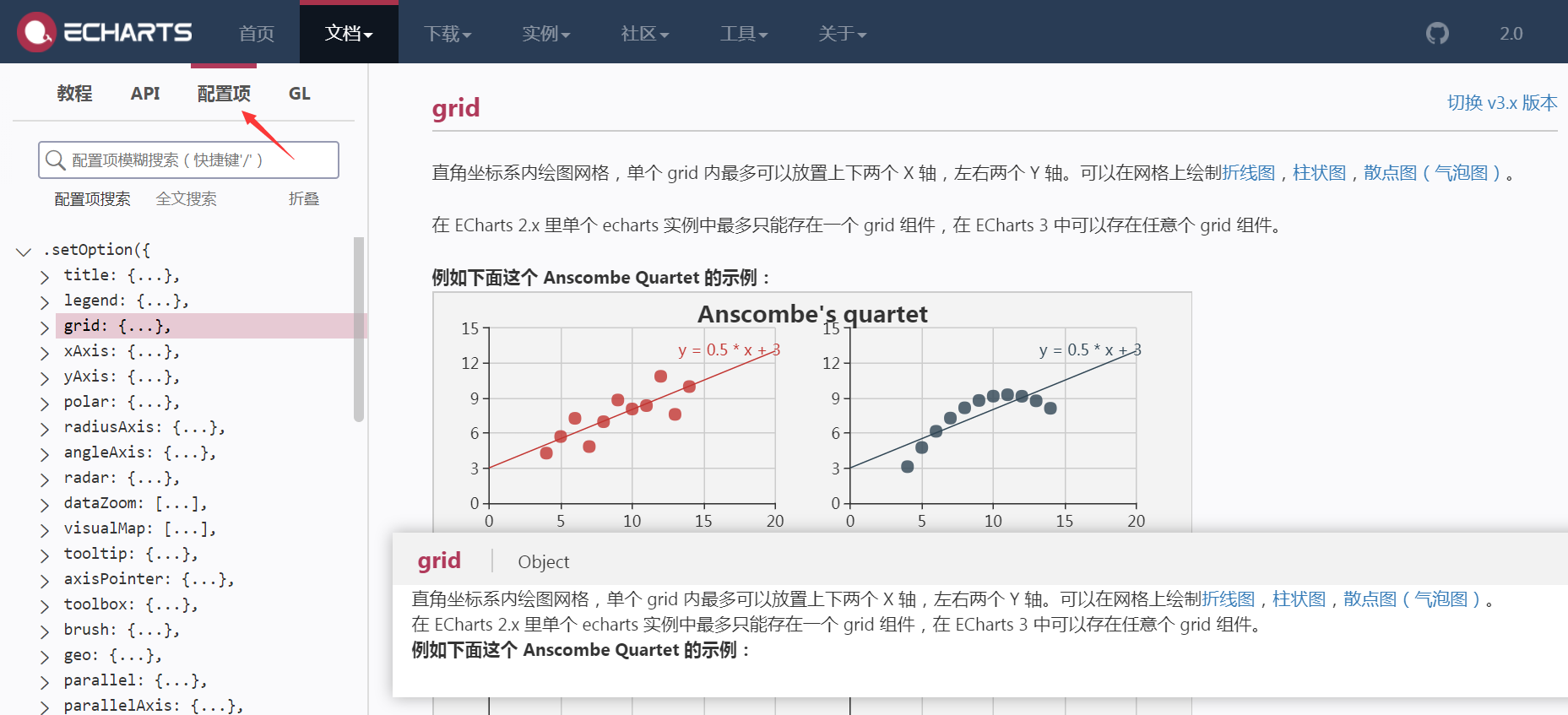
主题下载/定制主题:http://www.echartsjs.com/download-theme.html
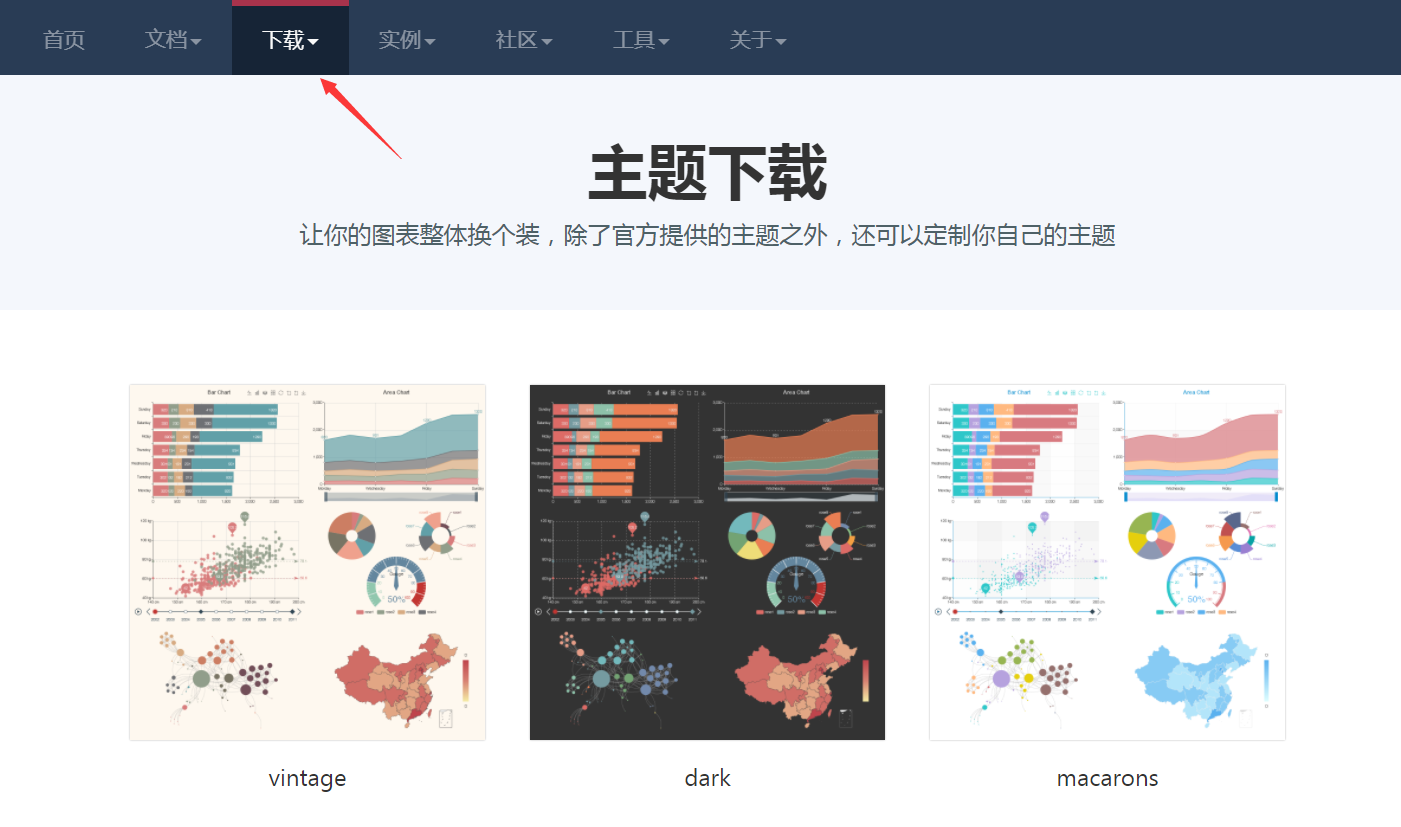
React组件化theme变量应用主题
echarts->echartTheme.js
export default {
"color": [
"#f9c700",
"#ff5400",
"#6699cc",
"#9cb3c5",
"#e0e6ec",
"#666666",
"#787464",
"#cc7e63",
"#724e58",
"#4b565b"
],
"backgroundColor": "#ffffff",
"textStyle": {},
"title": {
"textStyle": {
"color": "#cccccc"
},
"subtextStyle": {
"color": "#cccccc"
}
},
"line": {
"itemStyle": {
"normal": {
"borderWidth": 1
}
},
"lineStyle": {
"normal": {
"width": 2
}
},
"symbolSize": "10",
"symbol": "emptyCircle",
"smooth": false
},
"pie": {
"itemStyle": {
"normal": {
"borderWidth": 0,
"borderColor": "#ccc"
},
"emphasis": {
"borderWidth": 0,
"borderColor": "#ccc"
}
}
},
"categoryAxis": {
"axisLine": {
"show": true,
"lineStyle": {
"color": "#f1f3f5"
}
},
"axisTick": {
"show": true,
"lineStyle": {
"color": "#f1f3f5"
}
},
"axisLabel": {
"show": true,
"textStyle": {
"color": "#999999",
"fontSize": "14"
}
},
"splitLine": {
"show": true,
"lineStyle": {
"color": [
"#f1f3f5"
]
}
},
"splitArea": {
"show": false,
"areaStyle": {
"color": [
"rgba(250,250,250,0.3)",
"rgba(200,200,200,0.3)"
]
}
}
},
"valueAxis": {
"axisLine": {
"show": true,
"lineStyle": {
"color": "#f1f3f5"
}
},
"axisTick": {
"show": true,
"lineStyle": {
"color": "#f1f3f5"
}
},
"axisLabel": {
"show": true,
"textStyle": {
"color": "#999999",
"fontSize": "14"
}
},
"splitLine": {
"show": true,
"lineStyle": {
"color": [
"#f1f3f5"
]
}
},
"splitArea": {
"show": false,
"areaStyle": {
"color": [
"rgba(250,250,250,0.3)",
"rgba(200,200,200,0.3)"
]
}
}
},
"toolbox": {
"iconStyle": {
"normal": {
"borderColor": "#999999"
},
"emphasis": {
"borderColor": "#666666"
}
}
},
"legend": {
"textStyle": {
"color": "#333333"
}
},
"tooltip": {
"axisPointer": {
"lineStyle": {
"color": "#cccccc",
"width": 1
},
"crossStyle": {
"color": "#cccccc",
"width": 1
}
}
},
"timeline": {
"lineStyle": {
"color": "#293c55",
"width": 1
},
"itemStyle": {
"normal": {
"color": "#293c55",
"borderWidth": 1
},
"emphasis": {
"color": "#a9334c"
}
},
"controlStyle": {
"normal": {
"color": "#293c55",
"borderColor": "#293c55",
"borderWidth": 0.5
},
"emphasis": {
"color": "#293c55",
"borderColor": "#293c55",
"borderWidth": 0.5
}
},
"checkpointStyle": {
"color": "#e43c59",
"borderColor": "rgba(194,53,49,0.5)"
},
"label": {
"normal": {
"textStyle": {
"color": "#293c55"
}
},
"emphasis": {
"textStyle": {
"color": "#293c55"
}
}
}
},
"markPoint": {
"label": {
"normal": {
"textStyle": {
"color": "#ffffff"
}
},
"emphasis": {
"textStyle": {
"color": "#ffffff"
}
}
}
}
}echarts->themeLight.js
var colorPalette = [
'#C1232B',
'#27727B',
'#FCCE10',
'#E87C25',
'#B5C334',
'#FE8463',
'#9BCA63',
'#FAD860',
'#F3A43B',
'#60C0DD',
'#D7504B',
'#C6E579',
'#F4E001',
'#F0805A',
'#26C0C0'
];
export default { color: colorPalette, title: {
textStyle: {
fontWeight: 'normal',
color: '#27727B'
}
}, visualMap: {
color: ['#C1232B', '#FCCE10']
}, toolbox: {
iconStyle: {
normal: {
borderColor: colorPalette[0]
}
}
}, tooltip: {
backgroundColor: 'rgba(50,50,50,0.5)',
axisPointer: {
type: 'line',
lineStyle: {
color: '#27727B',
type: 'dashed'
},
crossStyle: {
color: '#27727B'
},
shadowStyle: {
color: 'rgba(200,200,200,0.3)'
}
}
}, dataZoom: {
dataBackgroundColor: 'rgba(181,195,52,0.3)',
fillerColor: 'rgba(181,195,52,0.2)',
handleColor: '#27727B'
}, categoryAxis: {
axisLine: {
lineStyle: {
color: '#27727B'
}
},
splitLine: {
show: false
}
}, valueAxis: {
axisLine: {
show: false
},
splitArea: {
show: false
},
splitLine: {
lineStyle: {
color: ['#ccc'],
type: 'dashed'
}
}
}, timeline: {
lineStyle: {
color: '#27727B'
},
controlStyle: {
normal: {
color: '#27727B',
borderColor: '#27727B'
}
},
symbol: 'emptyCircle',
symbolSize: 3
}, line: {
itemStyle: {
normal: {
borderWidth: 2,
borderColor: '#fff',
lineStyle: {
width: 3
}
},
emphasis: {
borderWidth: 0
}
},
symbol: 'circle',
symbolSize: 3.5
}, candlestick: {
itemStyle: {
normal: {
color: '#C1232B',
color0: '#B5C334',
lineStyle: {
width: 1,
color: '#C1232B',
color0: '#B5C334'
}
}
}
}, graph: {
color: colorPalette
}, map: {
label: {
normal: {
textStyle: {
color: '#C1232B'
}
},
emphasis: {
textStyle: {
color: 'rgb(100,0,0)'
}
}
},
itemStyle: {
normal: {
areaColor: '#ddd',
borderColor: '#eee'
},
emphasis: {
areaColor: '#fe994e'
}
}
}, gauge: {
axisLine: {
lineStyle: {
color: [
[
0.2, '#B5C334'
],
[
0.8, '#27727B'
],
[1, '#C1232B']
]
}
},
axisTick: {
splitNumber: 2,
length: 5,
lineStyle: {
color: '#fff'
}
},
axisLabel: {
textStyle: {
color: '#fff'
}
},
splitLine: {
length: '5%',
lineStyle: {
color: '#fff'
}
},
title: {
offsetCenter: [0, -20]
}
}
}- 引用主题
//导入主题
import echartTheme from './../echartTheme'
import themeLight from './../themeLight' - componentWillMount()中注册主题
componentWillMount(){
echarts.registerTheme('Default', echartTheme);
echarts.registerTheme('Light', themeLight);
} ReactEcharts组件中使用主题
<ReactEcharts theme="Default"/>
<ReactEcharts theme="Light"/>
React单页面应用中安装echarts、echarts-for-react(常用)
npm install echarts echarts-for-react --save
//或
yarn add echarts echarts-for-react --save引用echarts
方法一:加载全部echarts包(少用)
//加载全部echarts
import echarts from 'echarts'方法二:按需加载(常用)
//按需加载
import echarts from 'echarts/lib/echarts'
//必需基础组件
import 'echarts/lib/component/tooltip'
import 'echarts/lib/component/title'
import 'echarts/lib/component/legend'
import 'echarts/lib/component/markPoint'
//导入矩形图
import 'echarts/lib/chart/bar'
引用并初始化ReactEcharts:组件化开发,避免通过new对象的形式实现
import ReactEcharts from 'echarts-for-react' //render echarts options
<ReactEcharts option={this.getOption()} theme="Default"/>
二、柱形图功能实现
- echarts->bar->index.js:对应路由/admin/charts/bar
- 基本柱形图表
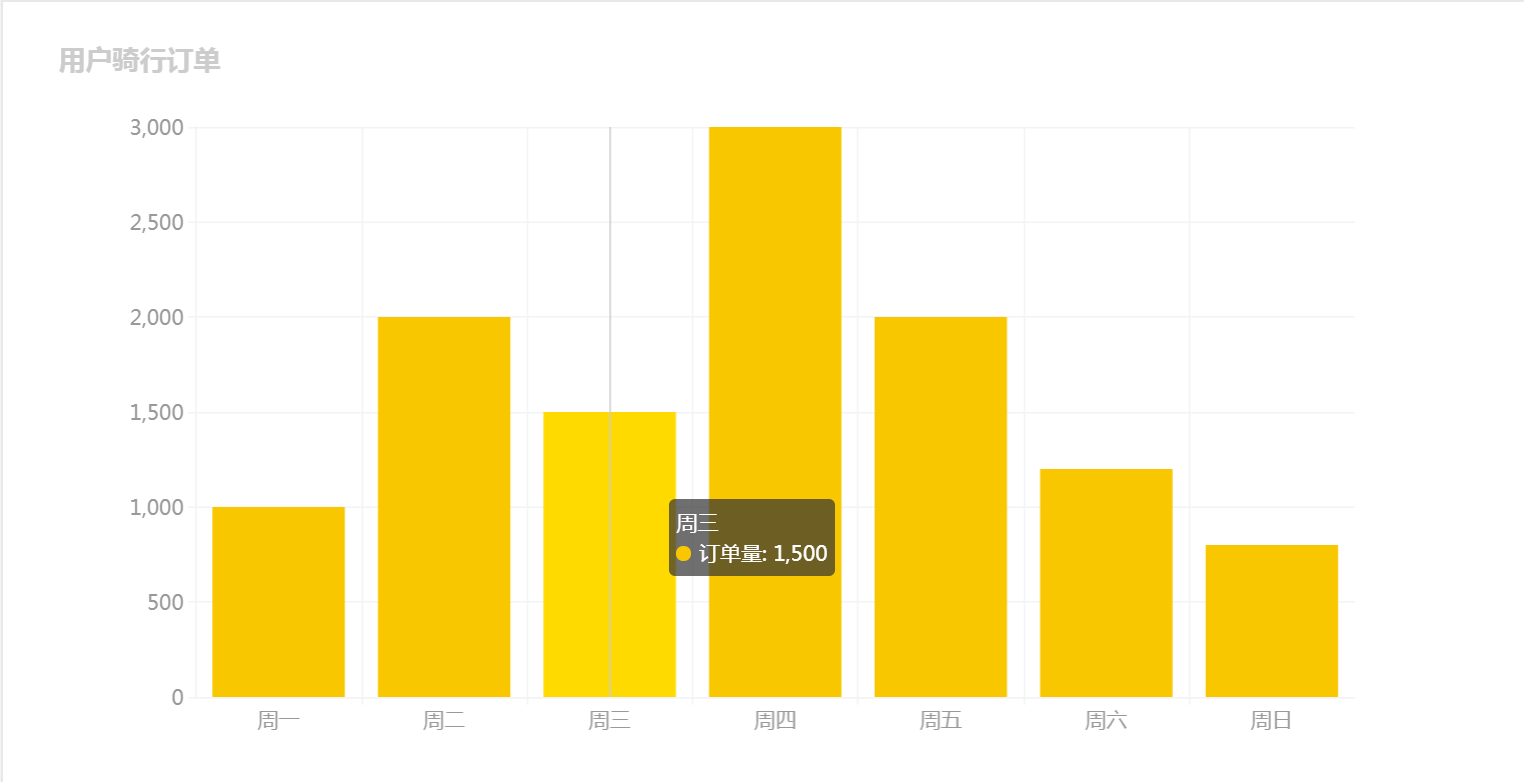
初始化ReactEcharts
<Card title="基本柱形图表">
<ReactEcharts option={this.getOption()} theme="Default" style={{height: 500}}/>
</Card>getOption()渲染数据:series为核心整体数据源,type为'bar'
getOption = () => {
let option = {
title: {
text: '用户骑行订单'
},
tooltip: {//提示条
trigger: 'axis'
},
xAxis: { //X轴
data: ['周一','周二','周三','周四','周五','周六','周日']
},
yAxis: { //Y轴
type: 'value'
},
series: [ //整体数据源
{
name: '订单量',
type: 'bar',
data: [1000, 2000, 1500, 3000, 2000, 1200, 800]
}
]
}
return option;
}
对比柱形图表
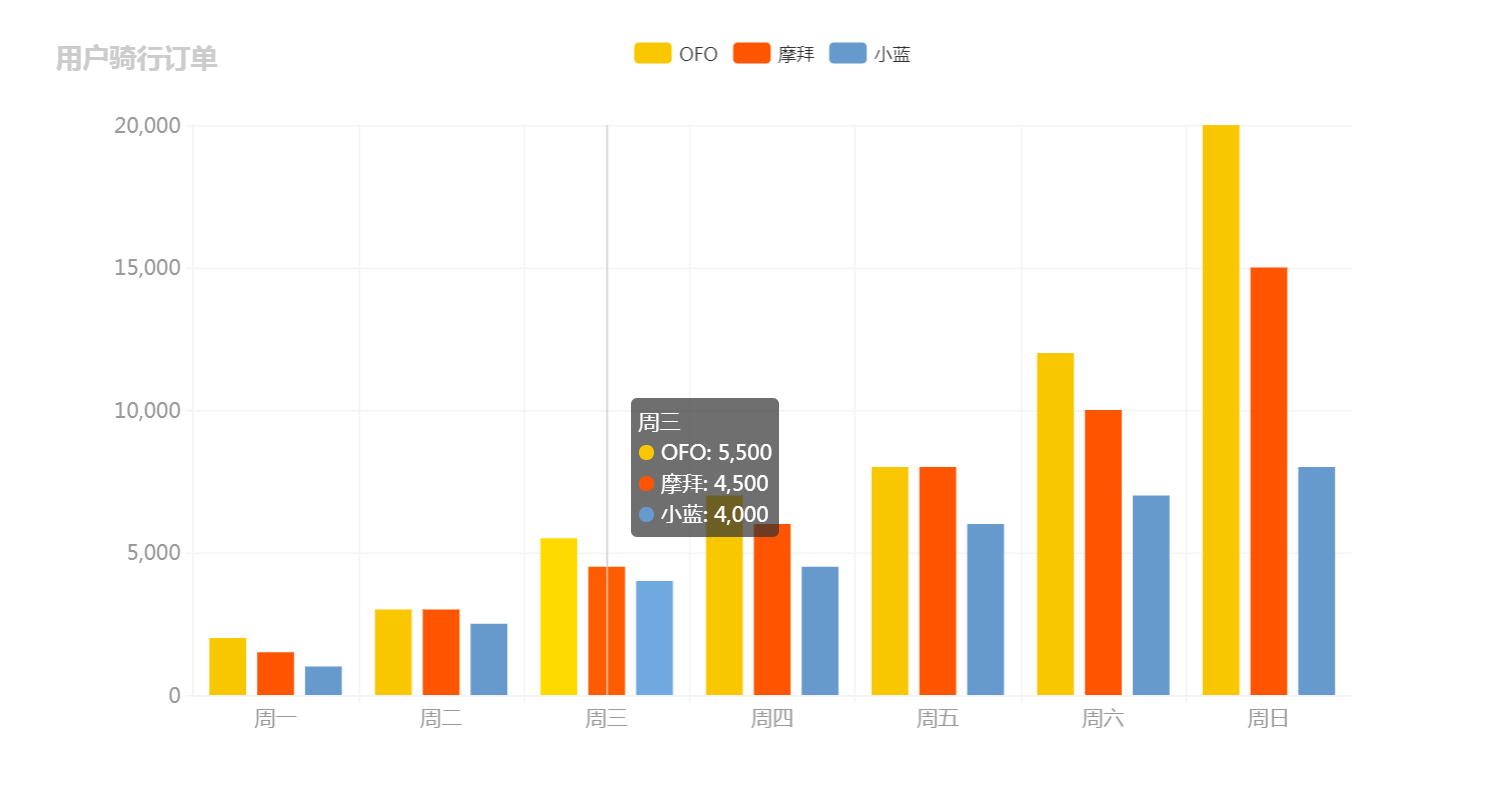
初始化ReactEcharts
<Card title="对比柱形图表">
<ReactEcharts option={this.getOption2()} theme="Default" style={{height: 500}}/>
</Card>getOption2()渲染数据
getOption2 = () => {
let option = {
title: {
text: '用户骑行订单'
},
legend: { //可过滤父标题
data: ['OFO','摩拜','小蓝']
},
tooltip: {
trigger: 'axis'
},
xAxis: {
data: ['周一','周二','周三','周四','周五','周六','周日']
},
yAxis: {
type: 'value'
},
series: [ //整体数据源
{
name: 'OFO',
type: 'bar',
data: [2000, 3000, 5500, 7000, 8000, 12000, 20000]
},
{
name: '摩拜',
type: 'bar',
data: [1500, 3000, 4500, 6000, 8000, 10000, 15000]
},
{
name: '小蓝',
type: 'bar',
data: [1000, 2500, 4000, 4500, 6000, 7000, 8000]
}
]
}
return option;
}
三、饼形图功能实现
- echarts->pie->index.js:对应路由/admin/charts/pie
- 按需加载导入饼图
//导入饼图
import 'echarts/lib/chart/pie' 饼形图表
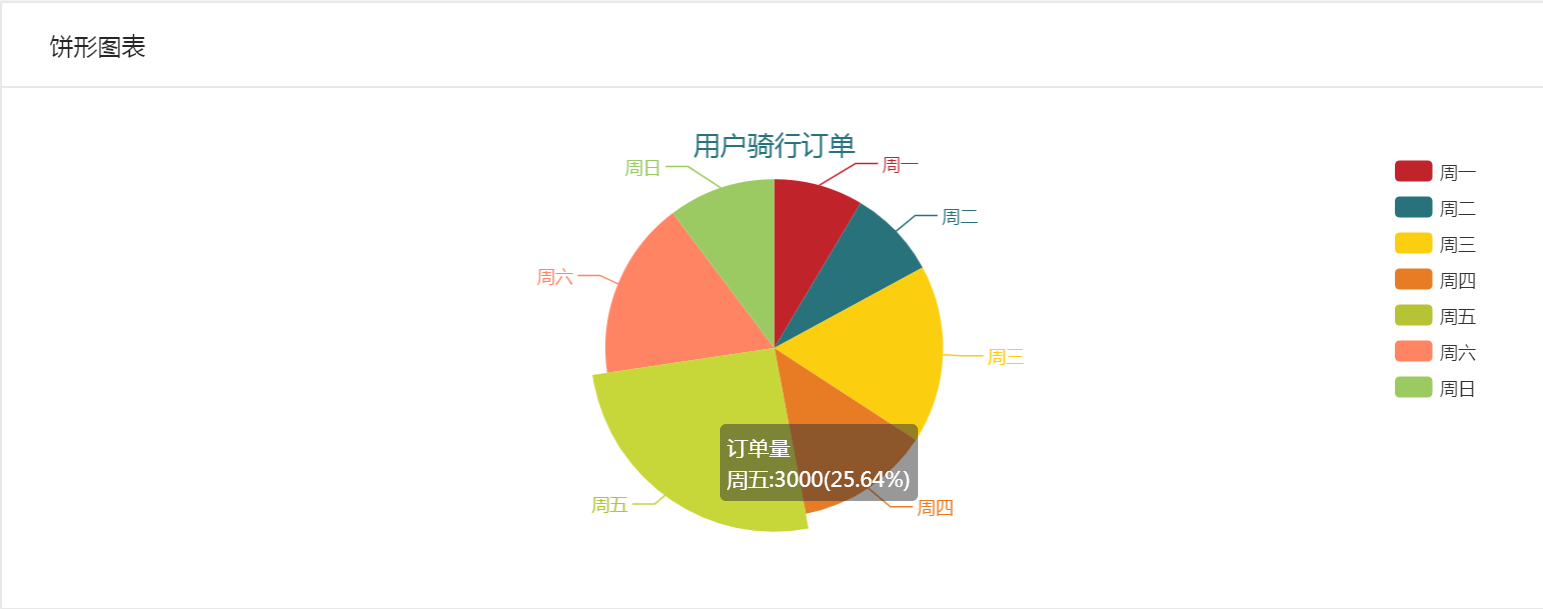
初始化ReactEcharts
<Card title="饼形图表">
<ReactEcharts option={this.getOption()} theme="Light"/>
</Card>getOption():关键在于option不同,type为'pie',data数组元素为对象
getOption = () => {
let option = {
title: {
text: '用户骑行订单',
x: 'center' //水平方向居中
},
legend: {
orient: 'vertical', //垂直方向排列
right: 10, //绝对定位位置
top: 20,
bottom: 20,
data: ['周一','周二','周三','周四','周五','周六','周日']
},
tooltip:{
trigger: 'item',
formatter: '{a}<br/>{b}:{c}({d}%)' //格式化提示项
},
series: [
{
name: '订单量',
type: 'pie',
data: [
{
value: 1000,
name: '周一'
},
{
value: 1000,
name: '周二'
},
{
value: 2000,
name: '周三'
},
{
value: 1500,
name: '周四'
},
{
value: 3000,
name: '周五'
},
{
value: 2000,
name: '周六'
},
{
value: 1200,
name: '周日'
}
]
}
]
}
return option;
}
- 环形图表

初始化ReactEcharts
<Card title="环形图表">
<ReactEcharts option={this.getOption2()} theme="Light"/>
</Card>getOption2():radius属性设置内环外环大小
getOption2 = () => {
let option = {
title: {
text: '用户骑行订单',
x: 'center' //水平方向居中
},
legend: {
orient: 'vertical', //垂直方向排列
right: 10, //绝对定位位置
top: 20,
bottom: 20,
data: ['周一','周二','周三','周四','周五','周六','周日']
},
tooltip:{
trigger: 'item',
formatter: '{a}<br/>{b}:{c}({d}%)' //格式化提示项
},
series: [
{
name: '订单量',
type: 'pie',
radius: ['50%','80%'], //内环外环大小
// center: ['30%','60%'], //x轴y轴位置
data: [
{
value: 1000,
name: '周一'
},
{
value: 1000,
name: '周二'
},
{
value: 2000,
name: '周三'
},
{
value: 1500,
name: '周四'
},
{
value: 3000,
name: '周五'
},
{
value: 2000,
name: '周六'
},
{
value: 1200,
name: '周日'
}
]
}
]
}
return option;
}
南丁格尔图表:表格按数据大小排序、半径或区域随数据递增
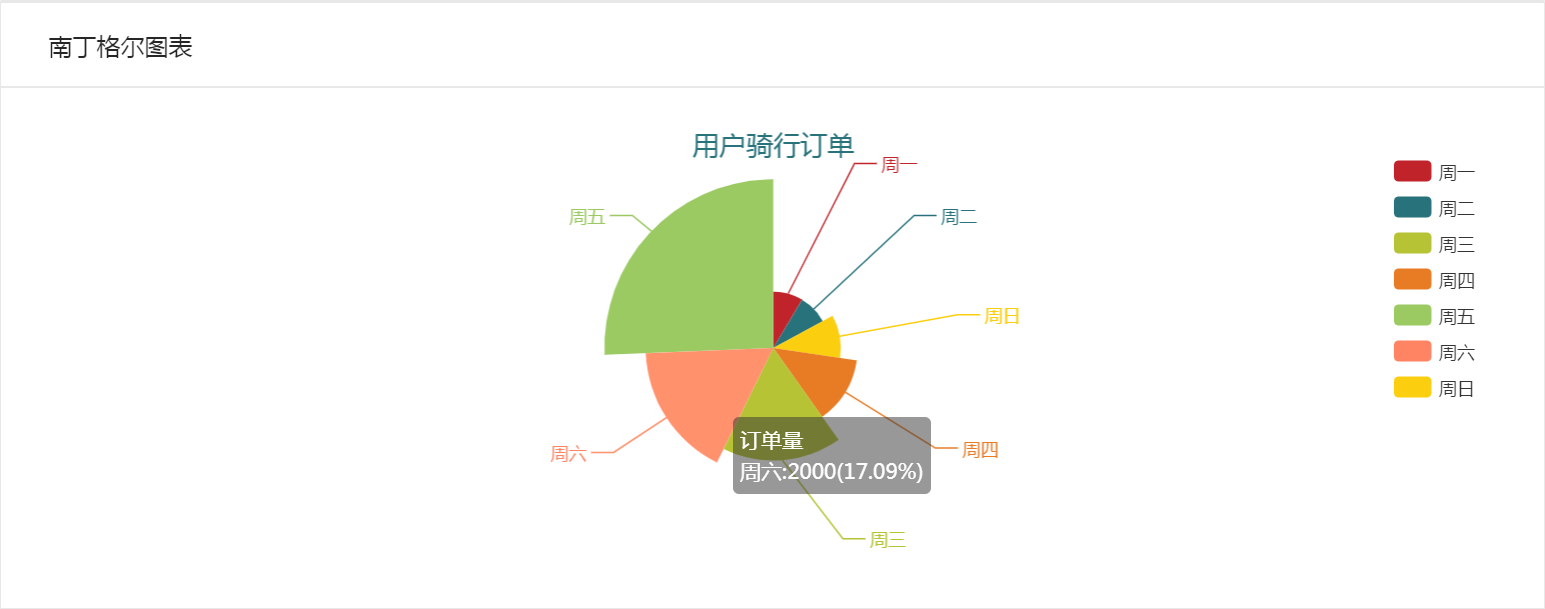
初始化ReactEcharts
<Card title="南丁格尔图表">
<ReactEcharts option={this.getOption3()} theme="Light"/>
</Card>getOption3():roseType属性指定半径radius或区域area
getOption3 = () => {
let option = {
title: {
text: '用户骑行订单',
x: 'center' //水平方向居中
},
legend: {
orient: 'vertical', //垂直方向排列
right: 10, //绝对定位位置
top: 20,
bottom: 20,
data: ['周一','周二','周三','周四','周五','周六','周日']
},
tooltip:{
trigger: 'item',
formatter: '{a}<br/>{b}:{c}({d}%)' //格式化提示项
},
series: [
{
name: '订单量',
type: 'pie',
data: [
{
value: 1000,
name: '周一'
},
{
value: 1000,
name: '周二'
},
{
value: 2000,
name: '周三'
},
{
value: 1500,
name: '周四'
},
{
value: 3000,
name: '周五'
},
{
value: 2000,
name: '周六'
},
{
value: 1200,
name: '周日'
}
].sort((a,b) => { //数据排序
return a.value - b.value;
}),
roseType:'radius', //数据大、半径大
}
]
}
return option;
}
四、折线图功能实现
- echarts->pie->index.js:对应路由/admin/charts/pie
- 按需加载导入折线图
//导入饼图
import 'echarts/lib/chart/line' 基本折线图表

初始化ReactEcharts
<Card title="基本折线图">
<ReactEcharts option={this.getOption()} theme="Default" style={{height: 500}}/>
</Card>getOption():指定xAxis和yAxis的数据,series中通过data存储趋势点
getOption = () => {
let option = {
title: {
text: '用户骑行订单'
},
tooltip: {
trigger: 'axis'
},
xAxis: {
data: [
'周一','周二','周三','周四','周五','周六','周日'
]
},
yAxis: {
type: 'value'
},
series: [
{
name: '订单量',
type: 'line',
data: [1000,2000,1500,3000,2000,1200,800] //趋势点
}
]
}
return option;
}
对比折线图表
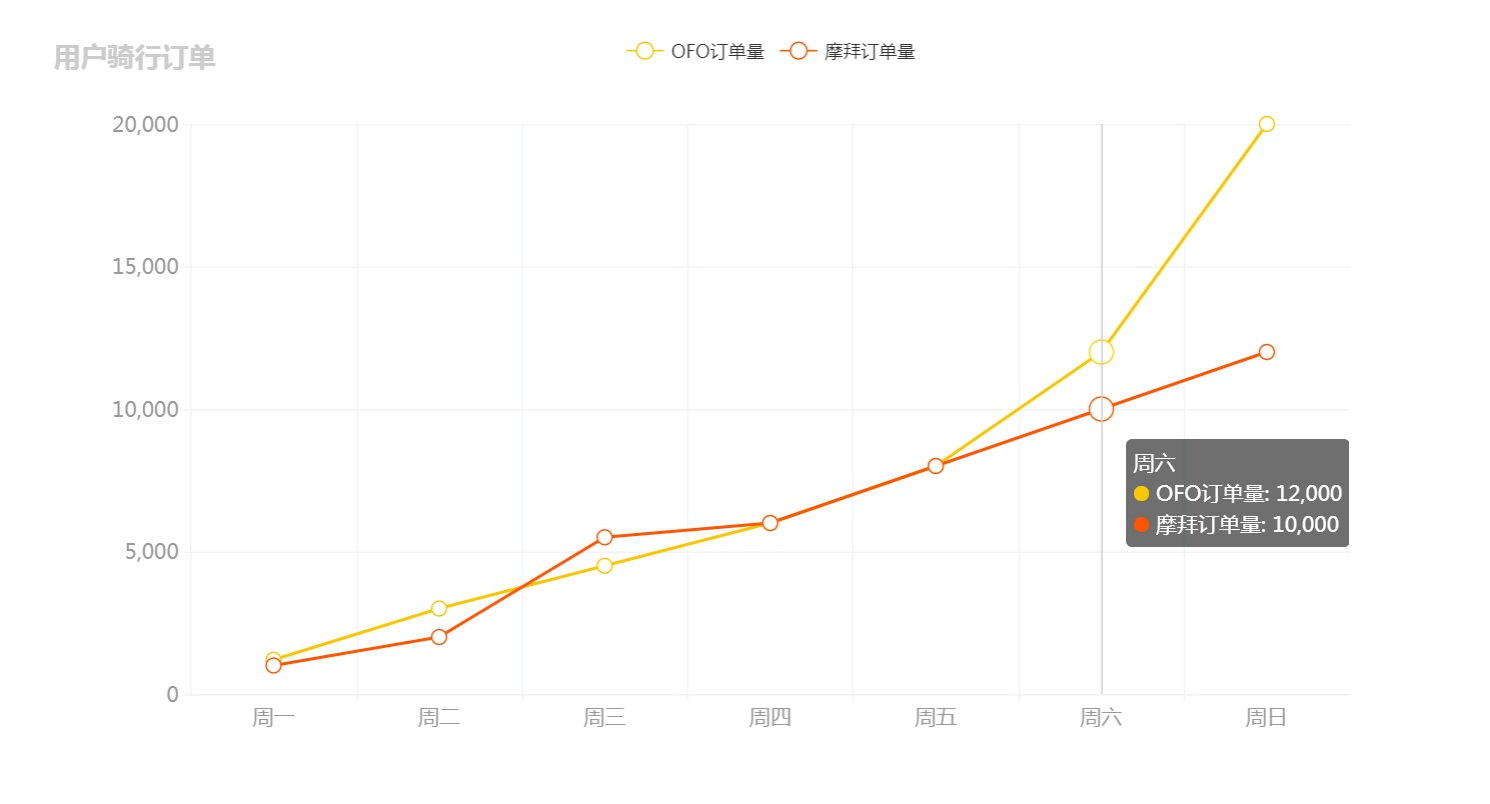
初始化ReactCharts
<Card title="对比折线图">
<ReactEcharts option={this.getOption2()} theme="Default" style={{height: 500}}/>
</Card>getOptions2():series整体数据源中多个数据对象对比
getOption2 = () => {
let option = {
title: {
text: '用户骑行订单'
},
tooltip: {
trigger: 'axis'
},
legend: {
data: ['OFO订单量','摩拜订单量']
},
xAxis: {
data: [
'周一','周二','周三','周四','周五','周六','周日'
]
},
yAxis: {
type: 'value'
},
series: [
{
name: 'OFO订单量',
type: 'line',
data: [1200,3000,4500,6000,8000,12000,20000] //趋势点
},
{
name: '摩拜订单量',
type: 'line',
data: [1000,2000,5500,6000,8000,10000,12000] //趋势点
}
]
}
return option;
}
区域折线图表

初始化ReactEcharts
<Card title="区域折线图">
<ReactEcharts option={this.getOption3()} theme="Default" style={{height: 500}}/>
</Card>getOption3():boundaryGap属性指定坐标轴从0开始,areaStyle属性指定区域填充样式
getOption3 = () => {
let option = {
title: {
text: '用户骑行订单'
},
tooltip: {
trigger: 'axis'
},
xAxis: {
boundaryGap: false, //坐标轴从起点开始,true时在中间
data: ['周一','周二','周三','周四','周五','周六','周日']
},
yAxis: {
type: 'value'
},
series: [
{
name: '订单量',
type: 'line',
data: [1000,2000,1500,3000,2000,1200,800], //趋势点
areaStyle: {} //区域填充颜色
}
]
}
return option;
}
注:转载请注明出处
【重点突破】—— Echarts图表的介绍和使用的更多相关文章
- 【重点突破】—— fetch()方法介绍
前言:ant-design-pro的技术组成主要是react+redux+dva+antd+fetch+roadhog,dva在源码包index.js里面导出了fetch,但是如果不想使用fetch库 ...
- ***ECharts图表入门和最佳实践
ECharts数据图表系统? 5分钟上手! [ECharts简介] ECharts开源来自百度商业前端数据可视化团队,基于html5 Canvas,是一个纯Javascript图表库,提供直观,生动, ...
- 【可视化】DataV接入ECharts图表库 可视化利器强强联手
DataV接入ECharts图表库 可视化利器强强联手 摘要: 两个扛把子级产品的结合,而且文末有彩蛋. DataV 数据可视化是搭建每年天猫双十一作战大屏的幕后功臣,ECharts 是广受数据可视化 ...
- 转:ECharts图表组件之简单关系图:如何轻松实现另类站点地图且扩展节点属性实现点击节点页面跳转
站点地图不外乎就是罗列一个网站的层次结构,提炼地讲就是一个关系结构图.那么我们如何巧用ECharts图表组件内的简单关系结构图来实现一个站点的地图结构呢?另外如何点击某个节点的时候实现页面跳转呢? 针 ...
- vue如何循环同一个echarts图表
因为我们知道echarts图表需要一个ID节点,所以我们循环echarts同一个图表时要考虑ID节点变化问题.废话不多说,直接上demo效果. 这里有一位分析师在不同的模拟组合,这时需求要在dialo ...
- Echarts图表插件(4.x版本)使用(二、带分类筛选的多个图表/实例化多个ECharts,以关系图/force为例)
导读 如果想在一个页面里实例化带分类筛选的多个Echarts该怎么做呢? 曾探讨了带分类选择的关系图显示为自定义图片的需求实现,传送门ECharts图表插件(4.x版本)使用(一.关系图force节点 ...
- ECharts图表插件(4.x版本)使用(一、关系图force节点显示为自定义图像/图片,带分类选择)
导读 ECharts,一个使用 JavaScript 实现的开源可视化库,可以流畅的运行在 PC 和移动设备上,兼容当前绝大部分浏览器(IE8/9/10/11,Chrome,Firefox,Safar ...
- echarts图表的封装
其实echarts官网有个快速上手的教程,一般人看一遍也知道是怎么回事,先给个传送门吧--五分钟上手 引入方式多种多样就自己去官网看了--这里简单介绍echarts怎么用,下方的封装函数比较重要 1. ...
- echarts图表第一个案例
1.action中获取到数据 @Override public String execute() throws Exception { List<Student> find = echar ...
随机推荐
- For Path
/****** Script for SelectTopNRows command from SSMS ******/ DECLARE @table TABLE (姓名 VARCHAR(10),课程 ...
- BZOJ 2199: [Usaco2011 Jan]奶牛议会
2199: [Usaco2011 Jan]奶牛议会 Time Limit: 10 Sec Memory Limit: 259 MBSubmit: 375 Solved: 241[Submit][S ...
- HDU RPG的错排 【错排&&组合】
RPG的错排 Time Limit: 1000/1000 MS (Java/Others) Memory Limit: 32768/32768 K (Java/Others)Total Subm ...
- Poj 2096 Collecting Bugs (概率DP求期望)
C - Collecting Bugs Time Limit:10000MS Memory Limit:64000KB 64bit IO Format:%I64d & %I64 ...
- Linux进程管理与调度-之-目录导航【转】
转自:http://blog.csdn.net/gatieme/article/details/51456569 版权声明:本文为博主原创文章 && 转载请著名出处 @ http:// ...
- UVA 10940 Throwing cards away II
题意略: 先暴力打表发现规律 N=1 ans=1N=2 ans=2N=3 ans=2N=4 ans=4N=5 ans=2N=6 ans=4N=7 ans=6N=8 ans=8N=9 ans=2N=10 ...
- windwos grpc 编译
此文档是windwos grpc c++ 编译 ,基于 vs2015 编译完成 获取gRPC源码 gRPC是开源框架,项目代码在github上,所以首先要安装github.github安装后,在指定文 ...
- mysq 中 information_schema 库
information_schema这个库,这个在mysql安装时就有了,提供了访问数据库元数据的方式.那什么是元数据库呢?元数据是关于数据的数据,如数据库名或表名,列的数据类型,或访问权限等.有些时 ...
- ubuntu默认用户分析
harvey@ubuntu:/etc$ cat -b passwd root:x:::root:/root:/bin/bash daemon:x:::daemon:/usr/sbin:/bin/sh ...
- 在C#中将金额转换成中文大写金额
具体代码如下: /// <summary> /// 金额转换成中文大写金额 /// </summary> /// <param name="LowerMoney ...
